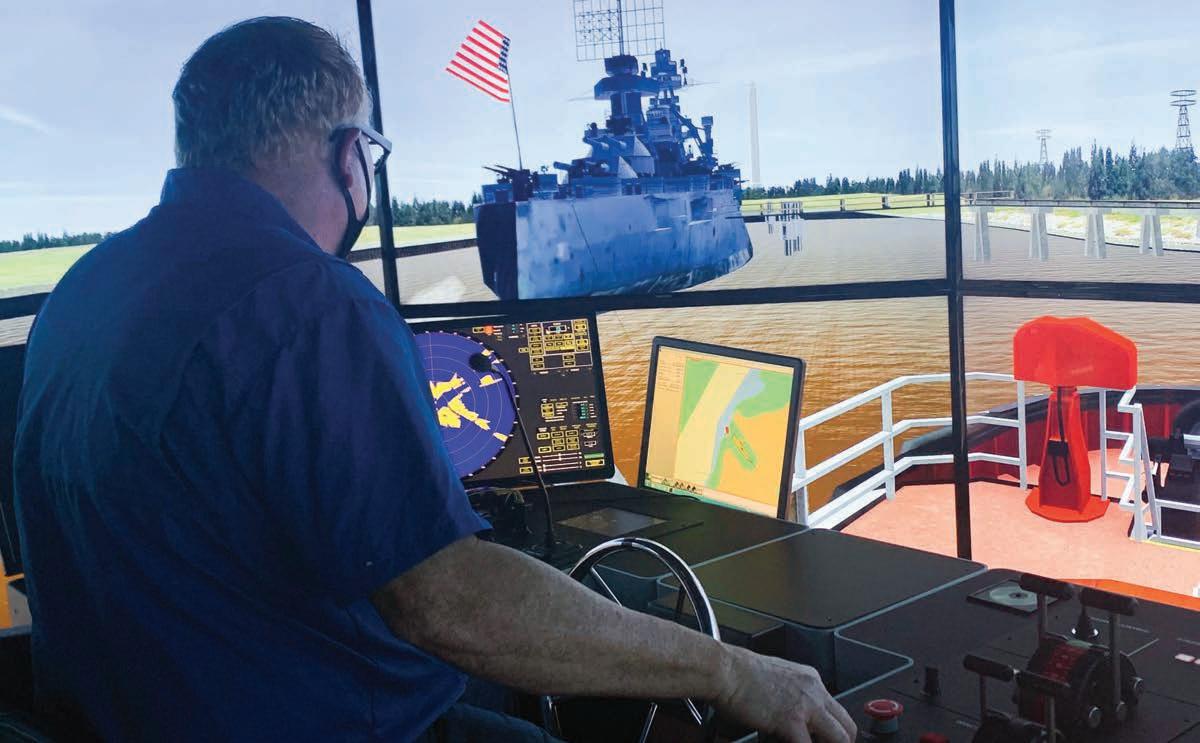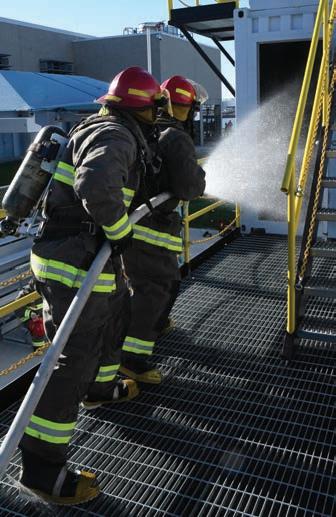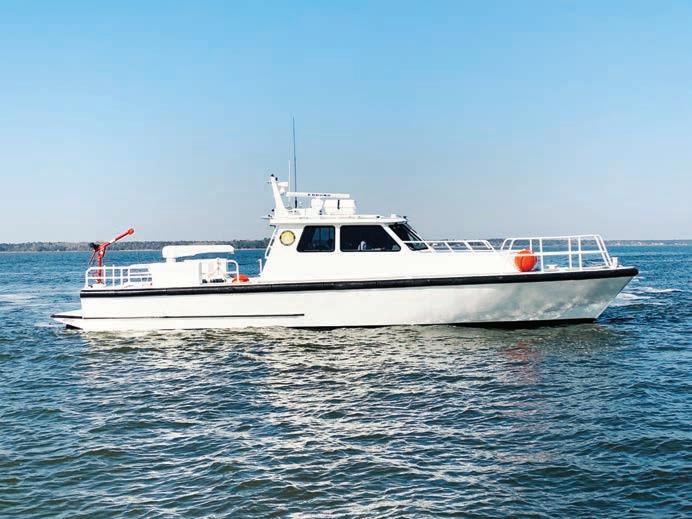
6 minute read
MARITIME TRAINING Maritime Education Transforms During COVID-19 Era
STAYING AHEAD
OF THE LEARNING CURVE
Advertisement
Maritime training transforms during the era of COVID-19
By Heather Ervin, Editor in Chief
It’s been almost one year since the deadly pandemic known as COVID-19 started spreading across the globe and companies are still feeling its effects and will perhaps for years to come. In response, most educators have had to adapt to online learning as an alternative, but what about the crucial handson learning experiences offered by so many maritime training centers?
Rick Schwab, senior director of the Maritime and Industrial Training Center at
Delgado Community College in New Orleans,
La., says, unsurprisingly, that COVID-19 has brought about significant changes for its training center.
“For the first time in 25 years, our entire training schedule had to be canceled for over a month, as the facility was shutdown because of the governor’s lockdown mandate,” says Schwab. “Corporate partner training programs were put on hold, as well.”
During the shutdown, Schwab said the college put into place several safety precautions to ensure its staff and students could attend classes safely. Smaller class sizes, social distancing, temperature checks, mask mandates, and hand sanitizer were put into place ahead of a hopeful return to school.
Another well known maritime college, the Maritime Training and Technology Center at San Jacinto College Program located just outside of Houston, Texas, had its own set of hurdles to overcome despite not enduring a shutdown like the one Delgado Community College underwent last year.
“We left for spring break in March 2020 with the expectation of returning as we do every spring, but we didn’t,” says John Stauffer, associate vice chancellor of maritime for the school. “We had to launch a business learning program with a partnership called Learn America, and that’s how we operated for incumbent workers.”
Stauffer says the school received U.S. Coast Guard authorization to conduct its Maritime Credit Program courses as a hybrid experience, where students have both online and offline (in-person) educational experiences. The school has been operating under a cautious eye and with a hybrid offering ever since.
It’s not all doom and gloom for these schools, though. Both have new and exciting training applications and courses to offer its students in 2021.
The Delgado Maritime Center has adapted to the new norm of working with corporate partners and mariners by building a few newly designed programs. Like San Jacinto, the school received Coast Guard approval to create hybrid courses with real-time lectures occurring through the Zoom platform.
“The Coast Guard courses approved for this hybrid learning were Basic & Advanced Firefighting and Advanced Firefighting,” says Schwab. “We also created a new deckhand training program for new hires, and we’re breaking ground on a new $1.4 million deckhand building with a barge set up for training new industry employees, giving them the opportunity to learn the ropes of the maritime industry.”
Schwab says the new building is expected
Delgado Maritime and Industrial Training Center: New Deckhand Building Rendering and Plans

Rendering of a new deckhand building in the works for students at Delgado Maritime Center.
to open in 2022.
As the bulk of courses move online, it’s important that maritime students still have access to hands-on training when possible.
San Jacinto, which was awarded a grant in October 2020, recently announced that it would be launching a new firefighting course in the next month or two using the funds it received. A new fire field was opened on campus, and the school says it will be conducting firefighting training classes off campus at various locations as well.
The new fire field includes a new natural gas-fed tank barge fire trailer provided to students in partnership with tank barge equipment provider ERL Commercial Marine Inc., New Albany, Ind. According to Amy Arrowood, director of the Maritime Credit Program at San Jacinto College’s Maritime Technology & Training Center, the new tank barge trailer includes all of the typical equipment one would find on a tank barge. “The hands-on trainer for both accredited and commercial classes for tankermen,” she adds.
The tank barge trailer has functional high-level and overfill alarms with cutaways for students to see how they operate and pressure and vacuum valves. The expansion truck has a cut away that shows a gauge tree, reach rods, gate valve, rising stick gauges, a spill rail with three different examples of scupper plugs, and a mockup of a deep well pump with a discharge flange.

San Jacinto College recently announced a new firefighting field training course for future mariners. Trends in Mariner Education
As new courses and ways of conducting maritime training are underway, there is a need for seasoned mariners to continue their education and undergo refresher trainer, especially for Coast Guard courses. In response, Delgado Community College has invested in simulation training in several areas.
“We have three full-mission simulators for wheelhouse training,” says Schwab. “We have a new Dynamic Positioning Simulator to run assessments. We also have invested in engineering classes for the other side of mariners’ careers.”
Schwab says the school has also invested in state-of-the-art virtual reality simulation software for Coast Guard-approved advanced firefighting that eliminates all field firefighting exercises to focus only on command and control simulated exercises.
“This is advanced training for advanced mariners that meets refresher requirements for licensed personnel,” adds Schwab. “This is competency training that highlights the advanced skill sets of mariners. It’s a new concept for 2021.”
Stauffer at San Jacinto College says that while simulation and virtual reality training existed before COVID-19, the technology will continue to be an important opportunity for virtual learning experiences.
“That technology was the ‘new thing’ in maritime training prior to COVID, and I think that will continue,” he says. Workboats and the Classroom
In other maritime education news, the Maine Maritime Academy (MMA), Castine, Maine, has partnered with SailPlan, a maritime technology startup based in Reston, Va., to accelerate the development of an intelligent vessel’s development navigation platform and shoreside vessel control.
MMA will equip its fleet, including the R/V Quickwater, an autonomous 41-foot workboat, with SailPlan’s intelligent navigation platform.
And taking maritime education offshore, in mid-January, Silver Ships Inc., Mobile, Ala., announced that it had delivered an 11-year-old, 48-foot refurbished workboat to the University of Southern Mississippi (USM). The workboat will be used as an offshore research vessel to support the university’s School of Ocean Science and Engineering.
The vessel in its original state was an Endeavor 45 built by Silver Ships in 2008 for the State of Mississippi Department of Marine Resources (DMR).
The transformation from an Endeavor 45 constructed as a cabin patrol vessel for Mississippi DMR to an Endeavor 48 research vessel involved careful strategy, design and reconstruction. The vessel needed to be updated and refitted to serve as an offshore research vessel to support the USM School of Ocean Science and Engineering’s deep ocean underwater surveys using various Uncrewed Underwater Vehicle systems (UUVs).

Silver Ships Inc., Mobile, Ala., announced that it has delivered an 11-year-old, 48-foot refurbished workboat to the University of Southern Mississippi for offshore research.

